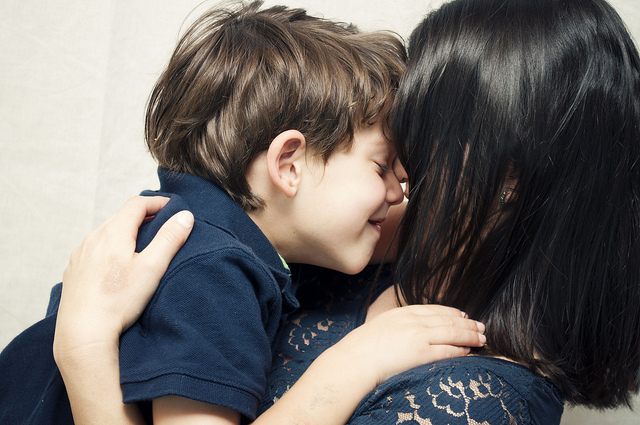I remember like it was yesterday: I was 21 years old and getting a biopsy on my cervix due to pre-cancerous cells, when out of nowhere my gyno says in a very matter-of-fact voice, “Oh, we’ll have to postpone, you’re pregnant.”
The room went fuzzy and I think I entered an altered reality for a moment. I was in college and this was not part of the plan.
I knew immediately who the father was—we had been dating on-and-off for about three or four years—and I tried to imagine his reaction. I went out to the waiting room crying and my Mom hugged me, thinking I was upset because of the procedure (Hello, get ready for this news!). I whispered in her ear while we were embracing, “I’m pregnant.” My best friend Sharon was also in the waiting room and to this day I am forever grateful to have had two strong amazing women in my presence at that moment.
I knew deep down inside I was going to have this baby and my life was about to change dramatically. I made my first pre-natal appointment on my way out, still in shock.
Throughout the pregnancy, life got real tough. I was still in school, working at a Mexican restaurant and interning with Target. Due to events that unfolded with my baby’s daddy, I knew we wouldn’t make it as a couple or a family.
I was going to be a Single Mom. I was heartbroken, scared, embarrassed and lonely.
Those first few years of co-parenting were excruciating. The mediation was devastating, as making a deal to share my son felt impossible. I was missing precious moments of my son’s life when he was not with me, yet I knew he needed his dad just as much as he needed me. His father and I would argue over parenting time, how to parent and everything else under the sun. We said hurtful things to each other that shook our confidence as parents, things we now regret.
Well, our son is now 12 (going on 16) and his father and I are on the other side of the toughest part. Although we’re not perfect, I believe we do a darn good job co-parenting. We have found a way, through all the pain, to put our son first.
I wanted to share our story for those of you just embarking on this journey, as I remember all too well just how hopeless it can feel. You are not alone. Here are a few thoughts to consider if you find yourself part of the modern family:
1. Release the shame: I know that as a young mother, I felt an incredible amount of shame for bringing my son into the world without the traditional family. I wondered if I gypped him of something instrumental to his development. Shame carries no benefit, only unnecessary weight. Kids thrive when they have at least one loving and nurturing parent they can attach to. Having two nurturing parents in their life, minus the marriage? Right on!
2. Don’t Bad Mouth your Ex: Put your pain and personal feelings toward your ex aside, as much as possible, to avoid damaging the relationship between your child and their other parent. All kids innately believe their parents are good. If you bad mouth your ex or make your child believe their other parent is fatally flawed, they inherently believe they are fatally flawed. They know they are the product of their parents, so in their minds how could they not be bad?
3. Build Your Ex Up: In regards to their ability to parent, build your ex up rather than tearing them down. Being a new parent is an extremely vulnerable time. We never really know if we are doing it right and there is already enough judgement in the world. Telling your ex they are a bad parent is soul sucking and can damage their confidence as a parent. If you need resources on parenting, reach out and learn, but don’t judge each other from the sidelines.
4. Try Mediation instead of a Custody Battle: Two hours of mediation was so emotional for me, I cannot imagine what six months (or six years) of court would have done to me…and my son. As hard as it is, your kiddo needs both you and your ex and if he/ she witnesses your ability to work together, he/she will gain so much from that. Plus, all that money you didn’t spend on attorneys you can put away for their college education.
5. Connect and Communicate with your Ex: Take time to communicate with your ex, if for nothing else than to touch base on your child and get on the same page with parenting. It is already tough on kids to have two houses, so having similar parenting styles (school priorities, rules, norms, diet, extracurricular activities) will help them transition. If both parents encourage the same study habits, eating habits and modes of play, your kid can build momentum. It’s important to note that no matter how hard you try, you will never parent exactly like your ex (or your new partner for that matter) and that’s okay. The most important thing to realize is your child is not a communication tool between you and your ex. “Tell your Dad….” is not their responsibility. And regardless of how innocent the message, it puts them in the middle.
6. Honor the Transition: Give your child an adequate transition period and transition item. Our son used to have two blankies he would take back and forth (he called them “Blankie” and “C-Guy”). When he was little, the transition period was so tough for him, there were moments I would come to pick him up and he would run from me! If that wasn’t a shame trigger, I don’t know what was. Remember, it’s not that they don’t love you, it’s just that they were settled into one space and now have to move to another. Handle it with patience and try not to take it personally. You may notice that their behavior is more challenging than usual the first day or two back at your house—this is normal.
7. Embrace your Modern Family: This might not work for all, but embrace your ex’s new partner and try to spend time together as one big, blended modern family. This can be brutal, but having an alliance with the new partner will provide you another contact, keeping you in the loop and helping you raise your child. Completely ignoring them means there is a part of your child’s life you are not privy to. As my son was growing up, our blended family would spend Halloween together and, although some were a little crazy, I knew it meant a lot to him to have all his loved ones in one place for a special occasion. These days, we sit together at his games and performances, presenting a united “Team Camden” in the crowd.
8. Talk to your Child: If you talk to them about what it’s like emotionally to have two houses, they will tell you. Pretending it’s a non-variable can prevent them from sharing what they’re experiencing, good and bad. This does not mean you should interrogate your child on what your ex is doing and what goes on at the other house. This puts your kiddo in the middle and they can sense the tension behind those questions. Show empathy for their situation. Eventually they may be able to verbalize both what’s tough about the blended family, and also what’s beneficial.
9. Know that It Gets Easier: The divorce, or break up, wound won’t always be this raw. As we heal, we can embrace the concept of blended family and even find ways to appreciate it. I fell in love again and am married to an amazing man who adores my son and gets along with my ex. When I get sad about my situation, I remind myself that my son has four loving parents instead of two—what a loved little dude.
As members of a modern family, we are all in this together. As long as we show love, acceptance and guidance to our kids—while taking care of ourselves and each other—we are providing more to our kids than what many receive. Although it might not have gone as planned, I’ve embraced the glorious mess the universe handed me. I feel such gratitude for having my son. Nothing in this world gives me more joy than him. And he wouldn’t be as amazing as he is without the love and relationship he has with his father and step parents.
Author: Brooke Jean
Editor: Nicole Cameron
Image: GabrielaPinto/Flickr, Jaysin Trevino/Flickr








Read 2 comments and reply